Since March, the way we’ve operated for nearly 20 years has been significantly disrupted. Our campuses, which once buzzed with visitors, volunteers and alumni, have been reduced to staff and participants only. And our open-door policy has been in a constant state of flux. This has been far from easy.
But here we are. Standing strong and continuing to serve those in need of recovery services around the clock – even amidst a pandemic.
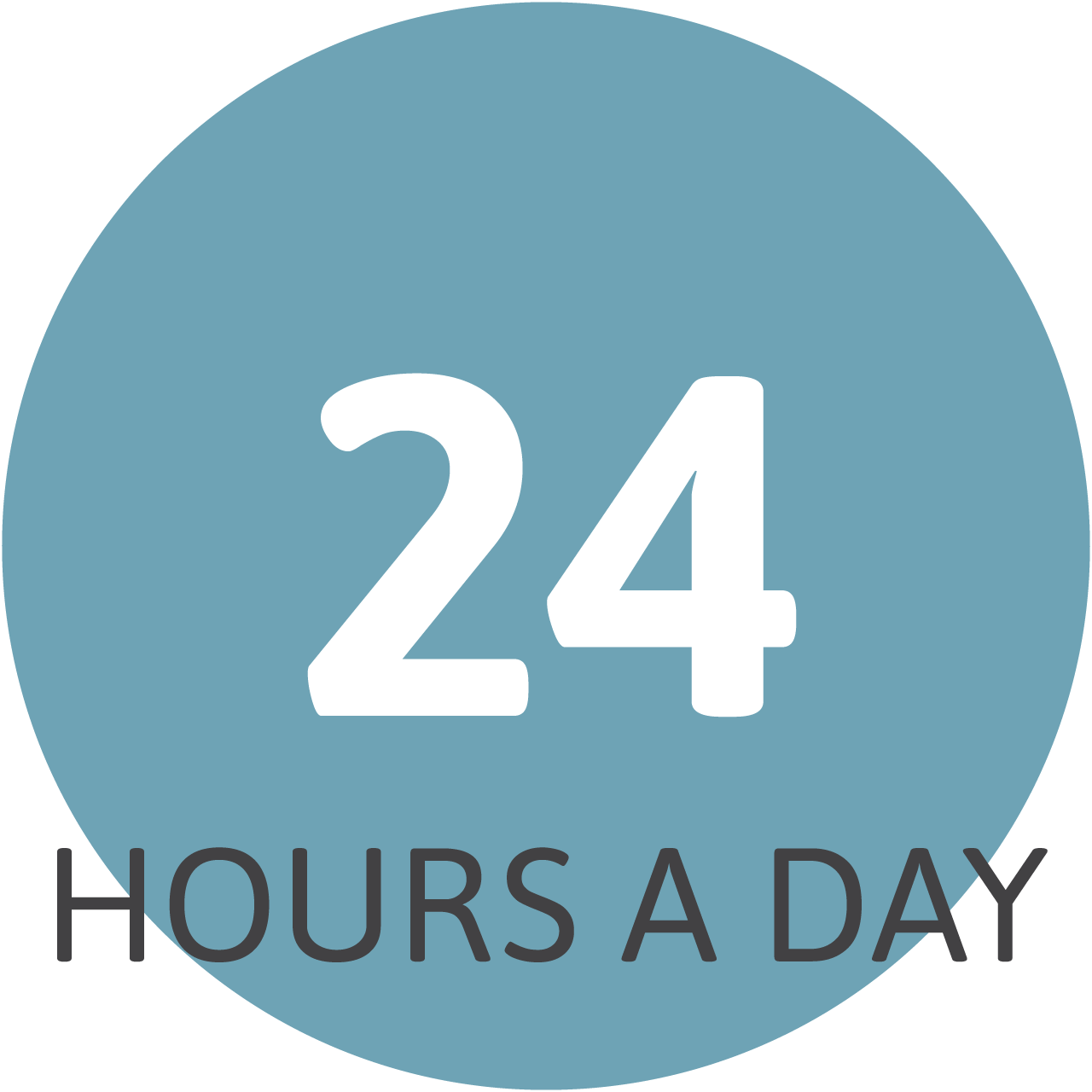
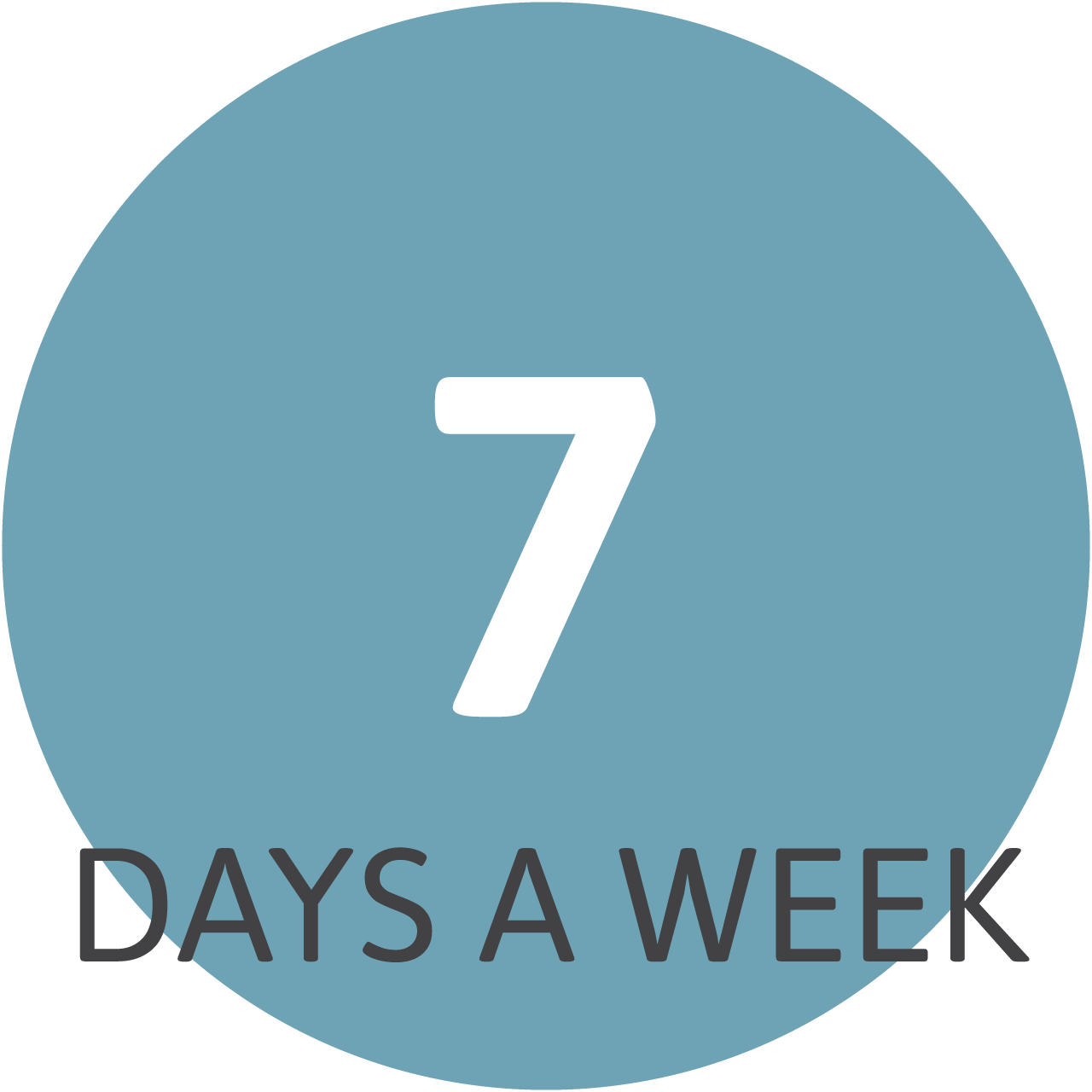
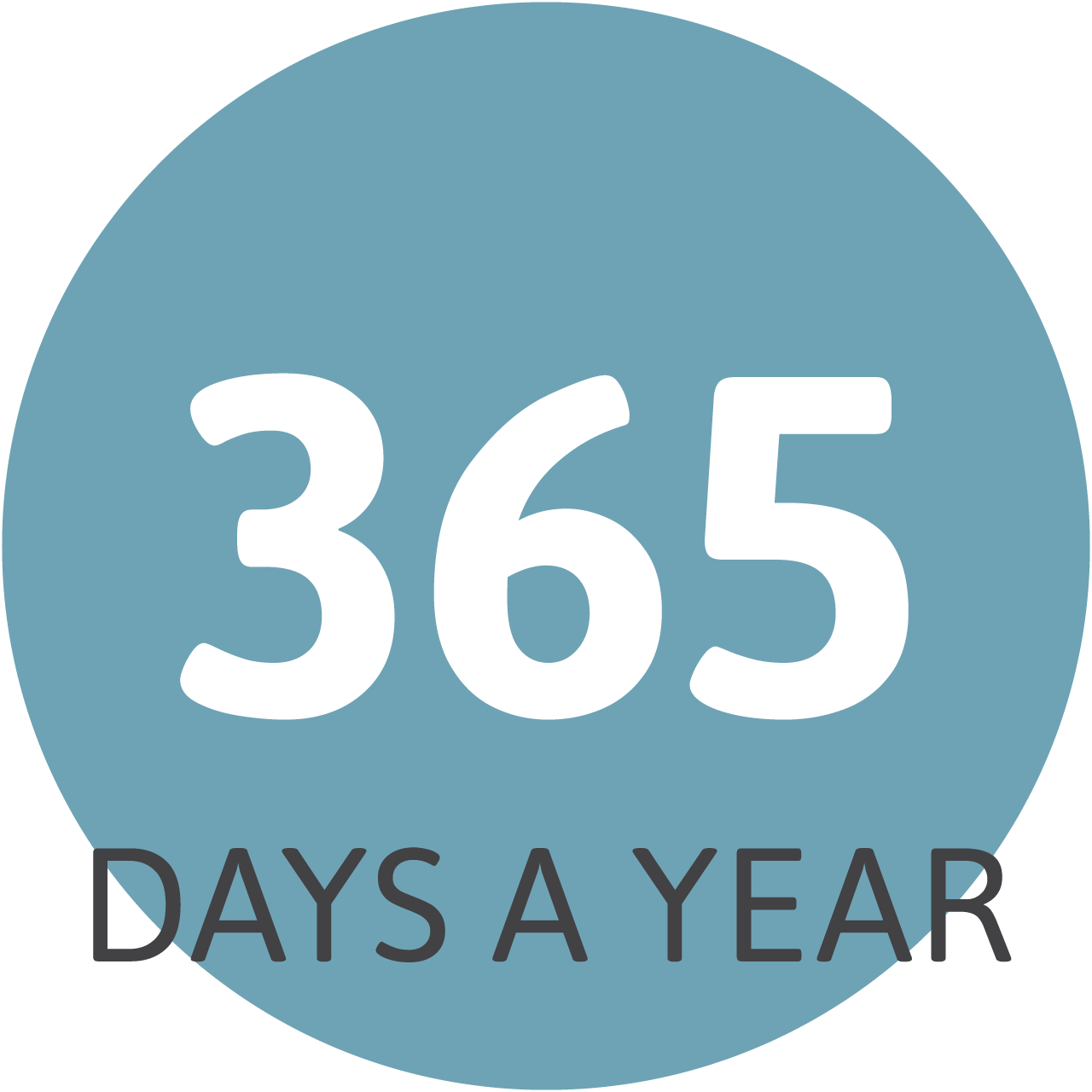

Because addiction never takes a break, neither will we.
FROM OUR HOME TO YOURS
For our participants and many of our 1,100+ alumni, our campuses are the only homes they’ve known in years. Without them, our mission does not become a reality. With them, miracles happen every day! Our participants count on our campuses as a place of refuge and healing 365 days a year. And our campuses count on YOU!
That’s why we’re bringing our campuses to you this month so you can see recovery again, even if only from afar. And in so doing, our hope is that you’ll not only see recovery through our eyes but also feel like you’re back on campus with us again. Because it’s been way too long…and we’ve missed you.



THERE’S NO PLACE LIKE HOME
Join us as we re-open our doors this holiday season and share some of our favorite spots on campus with you – spots where hope is found, lives are transformed, families are reunited and lifelong friendships are made.
-
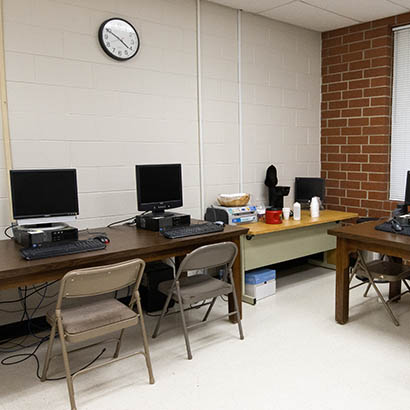
Life Skills Room
“This room has been a big part of my recovery. One of my teachers told me that I was the best in her class, and that meant so much to me that it just broke me down. I’ve learned and experienced a lot in this room.” — Craig, participant
At HT, our mission is to help folks return to a meaningful and productive life in the community which includes helping our participants find gainful employment. In the Life Skills Room, we are fortunate to have a faculty member from Wake Technical Community College volunteer to teach participants how to create resumes and learn computer skills to help them during a job search. Other areas of everyday life, such as financial skills, are also taught here.
-
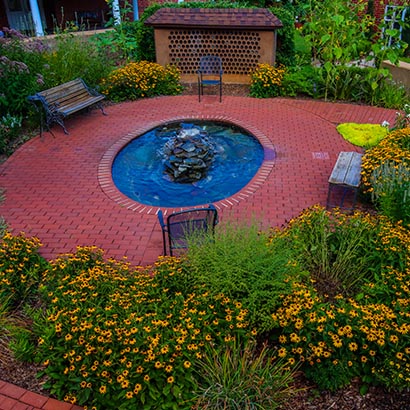
Memorial Garden
“The Memorial Garden is my go-to escape… I’ve been from one extreme to another in and around this garden and experienced a 180-degree difference in this same garden. A lot of my friends are on the memorial bricks, so that makes the meaning of this garden that much stronger for me.” — Paul, alumnus
The memorial garden at our men’s campus is a very serene place that folks utilize to reflect and meditate. During the summer, sunflowers tower over a vibrant garden that surrounds a babbling fountain. The pathway leading up to the fountain is made of bricks, which people can purchase in honor, or in remembrance, of someone. You will always see someone sitting in the garden reading, meditating, or chatting with peers, especially during the warmer months.
-
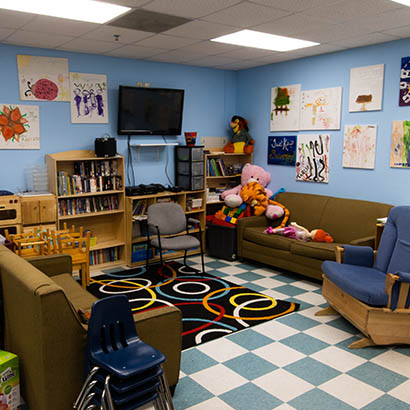
Bright Spaces
“After not seeing my daughter for a few months, Bright Spaces gave me a chance to celebrate her fourth birthday in the new place I was calling ‘home.’ Getting to share Bright Spaces with other mothers and children was really special too because I found new relationships, and so did she.” — Jamie, alumna
When the women’s campus opened in 2006, HT leadership immediately recognized a need to add services specifically for children. Fortunately, one of the first grants we received for the women’s campus was to create this kids/family room for our participants. Appropriately named, Bright Spaces offers a fun atmosphere where participants can spend valuable time with their children. Here, they are able to play, cook, create arts and crafts, and spend quality time together.
-
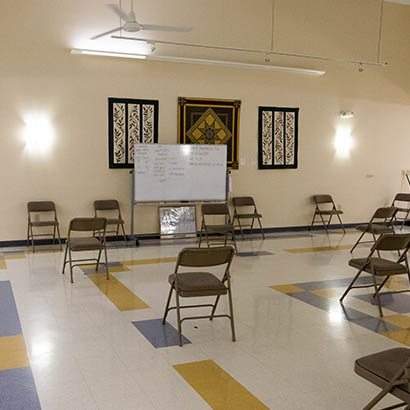
Mimi’s Room
“I’d been homeless and in and out of jail for a couple of years, so I didn’t have a place I could call ‘home.’ One day, I walked by Mimi’s Room and saw folks putting up this beautiful Christmas tree. It might seem so minimal, but to me, I hadn’t seen a Christmas tree, lights, or gifts in so long that it immediately gave me a sense of home.” — Jasmine, alumna
The largest indoor space at our women’s campus, Mimi’s Room, is where women’s Transition Ceremonies are held, celebrating those who have completed the recovery program and have transitioned back into everyday life within the community. Mimi’s Room is also used to hold meetings and as a lounge for participants to continue recovery work or relax.
THERE’S NO PLACE LIKE HOME
Join us as we re-open our doors this holiday season and share some of our favorite spots on campus with you – spots where hope is found, lives are transformed, families are reunited and lifelong friendships are made.
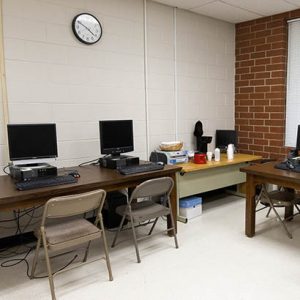
Life Skills Room
“This room has been a big part of my recovery. One of my teachers told me that I was the best in her class, and that meant so much to me that it just broke me down. I’ve learned and experienced a lot in this room.” — Craig, participant
At HT, our mission is to help folks return to a meaningful and productive life in the community which includes helping our participants find gainful employment. In the Life Skills Room, we are fortunate to have a faculty member from Wake Technical Community College volunteer to teach participants how to create resumes and learn computer skills to help them during a job search. Other areas of everyday life, such as financial skills, are also taught here.
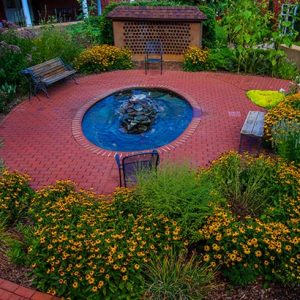
Memorial Garden
“The Memorial Garden is my go-to escape… I’ve been from one extreme to another in and around this garden and experienced a 180-degree difference in this same garden. A lot of my friends are on the memorial bricks, so that makes the meaning of this garden that much stronger for me.” — Paul, alumnus
The memorial garden at our men’s campus is a very serene place that folks utilize to reflect and meditate. During the summer, sunflowers tower over a vibrant garden that surrounds a babbling fountain. The pathway leading up to the fountain is made of bricks, which people can purchase in honor, or in remembrance, of someone. You will always see someone sitting in the garden reading, meditating, or chatting with peers, especially during the warmer months.
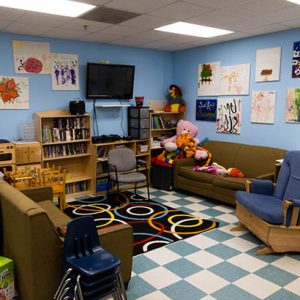
Bright Spaces
“After not seeing my daughter for a few months, Bright Spaces gave me a chance to celebrate her fourth birthday in the new place I was calling ‘home.’ Getting to share Bright Spaces with other mothers and children was really special too because I found new relationships, and so did she.” — Jamie, alumna
When the women’s campus opened in 2006, HT leadership immediately recognized a need to add services specifically for children. Fortunately, one of the first grants we received for the women’s campus was to create this kids/family room for our participants. Appropriately named, Bright Spaces offers a fun atmosphere where participants can spend valuable time with their children. Here, they are able to play, cook, create arts and crafts, and spend quality time together.
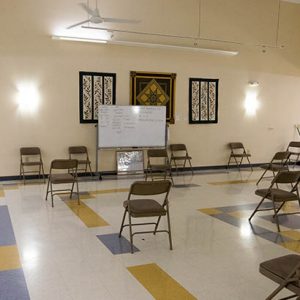
Mimi’s Room
“I’d been homeless and in and out of jail for a couple of years, so I didn’t have a place I could call ‘home.’ One day, I walked by Mimi’s Room and saw folks putting up this beautiful Christmas tree. It might seem so minimal, but to me, I hadn’t seen a Christmas tree, lights, or gifts in so long that it immediately gave me a sense of home.” — Jasmine, alumna
The largest indoor space at our women’s campus, Mimi’s Room, is where women’s Transition Ceremonies are held, celebrating those who have completed the recovery program and have transitioned back into everyday life within the community. Mimi’s Room is also used to hold meetings and as a lounge for participants to continue recovery work or relax.
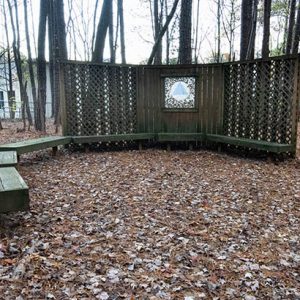
Meditation Trail
“When I came through the recovery program, I would go on the Women’s Meditation Trail to get away and be in nature. It was cool because you walk in, and it wraps around the building. Each section has a sitting area where you can reflect and grow. I have a deep connection with that trail.” — Gina, alumna
A few years ago, a couple of participants from the women’s campus really got into running, as it helped with their recovery. Seeing their growing interest in running and exercise, a few of our staff members brainstormed an idea to build a trail between the women’s campus and Umstead Park. Now, the trail is utilized to run or walk, and gives the women a peaceful place to work on their mental and physical health.
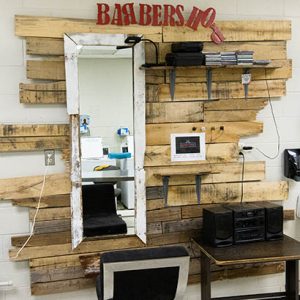
Barbershop
“Part of the laundry room has a section that is reminiscent of a Barbershop, and I found that to be a solace. I had experience cutting hair, so I started helping out. Listening to participant’s stories as I cut their hair helped me connect with everyone. I could relate to what each was going through and saw how similar our recovery stories are.” — Tevin, participant
When the participants at our men’s campus aren’t in meetings or classes, they are able to spend some quality time with one another while utilizing the CTR lounge and Barbershop. These spaces offer much needed normalcy, where they can watch movies or sports, play games, and socialize. All the while, knowing that everyone is working toward the same goal of recovery.
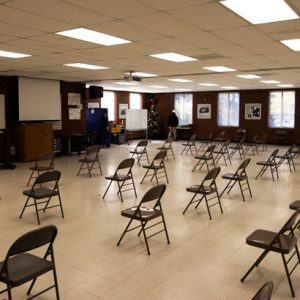
Community Room
“It was while I was staying in the Community Room that I admitted I was powerless and my life was unmanageable. Coming from the area of life I was in and doing the things I was doing on the street, it took a lot of willingness and paying attention to get to this point where I could communicate. That comes from the growth I’ve experienced here.” — Dominique, participant
The community room at the men’s campus is one of the most widely-utilized spaces at either of our campuses. This is where men’s Transition Ceremonies are held, celebrating those who have completed the recovery program and have transitioned back into everyday life within our community. This space is also utilized for meetings, classrooms, and community events (when we’re not in a pandemic).
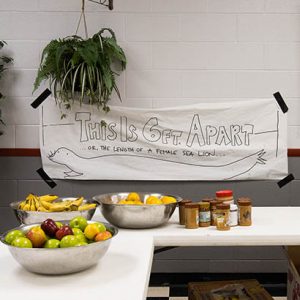
Cafeteria
“Another participant and I cook lunch and dinner for 70+ women each day. Working in the Cafeteria has done so much for our self-esteem. Doing something well and having people tell you you’re doing a great job has helped me believe in myself again. It’s also helped teach me how to get along better with others.” — Toby, participant
The cafeterias serve multiple purposes. Not only are they where nearly 300,000 meals are served each year, but at the men’s campus, the cafeteria is where the weekly family support group is held. These groups are open to family, friends, and loved ones of anyone suffering with substance use since alcoholism and other drug addictions are diseases that affect the entire family.
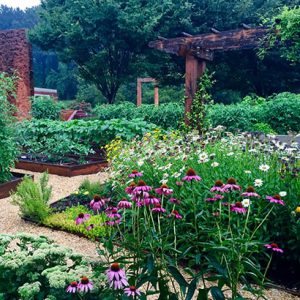
Garden/Courtyard
“I tend to the Garden/Courtyard and make sure it’s fertilized and watered. We make sure everything is taken care of so the guys around here can have some fresh fruit and produce. It feels good to take care of something and to have it look pretty out here. It’s something for the guys to look at.” – Dalin, participant
The courtyards are the heartbeat of recovery and community at Healing Transitions. This is where participants get to spend quality time with one another, meditate, exercise, and relax after a full day of self-work. The courtyards serve as the main areas for cookouts as well, which has greatly helped HT connect with the community. Each courtyard also has a garden which is maintained by nominated participants. These gardens provide fresh fruits and vegetables which are used by our kitchens for meal services.
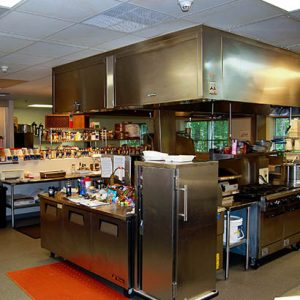
Kitchen
“When I came to Healing Transitions, I started in the Kitchen as a cook. Chef Kathy does a great job of getting us to understand how important the chain of command is in the kitchen, so it really teaches you to listen. Taking those lessons of listening has really helped in my own recovery. If you take the advice from those who have experienced it and know better, you’re going to have a better chance of making it.” – Jim, participant
Did you know that Healing Transitions serves nearly 300,000 meals each year? In 2019, we served more than 292,000 meals between our men’s and women’s campuses, all of which are prepared in two kitchens – one at each campus. We have three full-time staff members who run the kitchens, along with nominated program participants, and the generosity of community volunteers. We rely on donations from the community for the food that we serve, as well as what we can grow in our courtyard gardens.
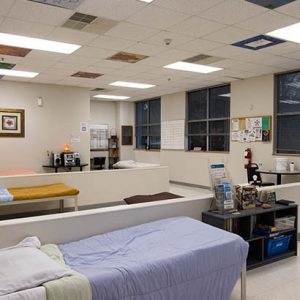
Detox
“Before Healing Transitions, I was homeless and living on the streets. Most nights, I’d sleep with a knife under my pillow because I constantly lived in fear. I remember my mom dropping me off at Detox late one night. I had no idea where I was. All I knew was that the minute I walked in, I felt peace and a level of safety I hadn’t felt in more than five years. It was in that moment that I knew everything was going to be okay.” —Terri, alumna
Our non-medical detox centers provide services 24/7 and offer an alternative to emergency rooms, jails, or the streets. The goals of our detox centers are to be a safe place for an individual to detox, and to be a link to further resources to help the individual achieve recovery. In many cases, the detox centers provide the very first glimpse of recovery for folks struggling with substance use disorders. This is one of the most crucial services we provide, so much so that when we had to shut our doors for the first time in our 19-year history as a precaution to COVID-19 in March, we quickly worked to find a temporary off-campus facility to open a remote detox center. Because we knew that people still needed this critical recovery service. Fortunately, we have been able to return our on-campus detoxes back to operation.
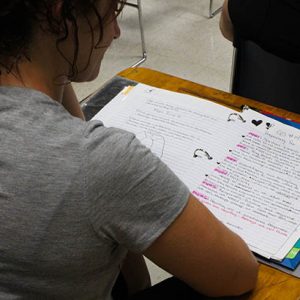
Classroom
“I got here last October, and in the early parts of the program I learned most of the information about my disease in the Classroom. That’s where the process of recovery was broken down and it just made sense. My peer mentors at the time taught the classes and were very insightful. The classroom has been important in my recovery.” – Charlene, participant
The classrooms at Healing Transitions are where some of the most critical recovery work in the program happens. These spaces are where our Recovery Dynamics classes are taught, helping our participants better understand how addiction impacts their mind, body, and the people around them. And they’re where the foundation of recovery is laid, giving each participant important knowledge that they’ll take with them for the rest of their lives.
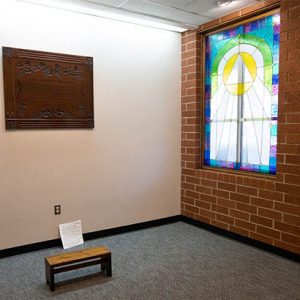
Men’s Chapel
“I’ve found that in my personal recovery, it is very important for me to find a power greater than myself. I like to go into the Chapel to pray in the morning and night. I’m usually very compulsive and spontaneous, so taking down time to be still, gather my thoughts, and pray has brought me peace. If I’m having a bad day, I’ll head to the chapel. I like praying out loud and hearing the echo in there. It’s relaxing to hear myself while I talk to the Lord. The chapel has also helped me fellowship with the other participants, as we have a Bible study in the chapel once a week. It’s a beautiful space and I feel blessed to have that place.” – Sergio, participant
The Chapel is an important space for many of the participants who come through our doors. Open to any faith and denomination, participants utilize the chapel to pray, meditate, and generally work on their faith and spirituality. It’s a very peaceful space on campus, void of most distractions, so participants can truly focus on their inner work.
YOUR GIFT SAVES LIVES
YOU keep our doors open. It’s that simple. So, here’s what we’re asking. We need to raise $365,000 between now and December 31 in order to continue keeping our doors open around the clock. Remember, without the generous support of our recovery village, our life-saving work and the homes we provide to those in need would not be possible. So, as we bring our homes to yours this holiday season, we hope you’ll experience their significance and give generously to keep them going.
OUR GOAL
OUR PROGRESS
Your gift enables us to never turn someone away who needs our help.


Before Healing Transitions, I was homeless and living on the streets. Most nights, I’d sleep with a knife under my pillow because I constantly lived in fear. I remember my mom dropping me off at detox late one night. I had no idea where I was. All I knew was that the minute I walked in, I felt peace and a level of safety I hadn’t felt in more than five years. I had sheets and a bed. The women who welcomed me that night greeted me with huge smiles and were genuinely happy to see me. It was in that moment that I knew everything was going to be okay. — an excerpt from Terri’s story

Before Healing Transitions, I was homeless and living on the streets. Most nights, I’d sleep with a knife under my pillow because I constantly lived in fear. I remember my mom dropping me off at detox late one night. I had no idea where I was. All I knew was that the minute I walked in, I felt peace and a level of safety I hadn’t felt in more than five years. I had sheets and a bed. The women who welcomed me that night greeted me with huge smiles and were genuinely happy to see me. It was in that moment that I knew everything was going to be okay. — an excerpt from Terri’s story



